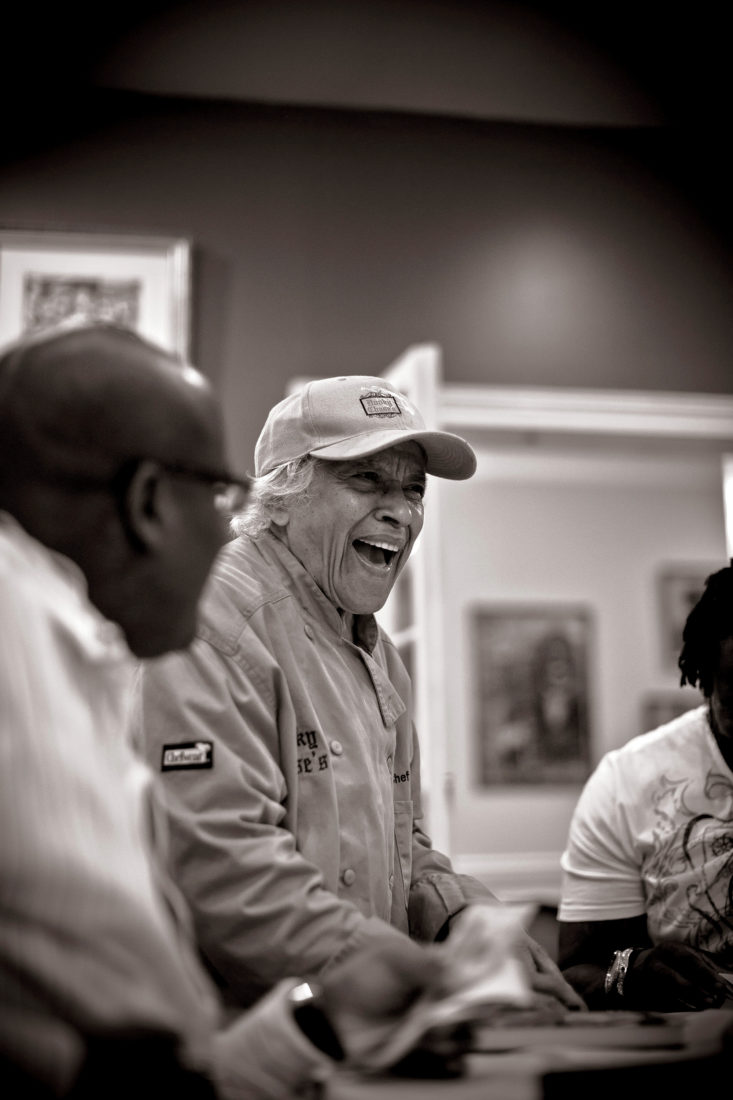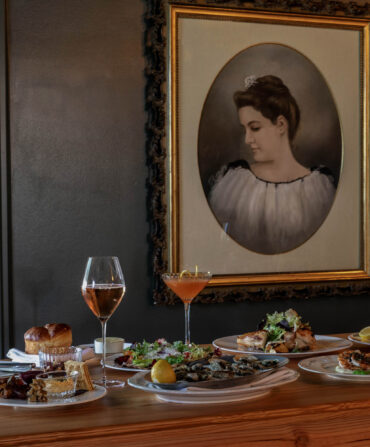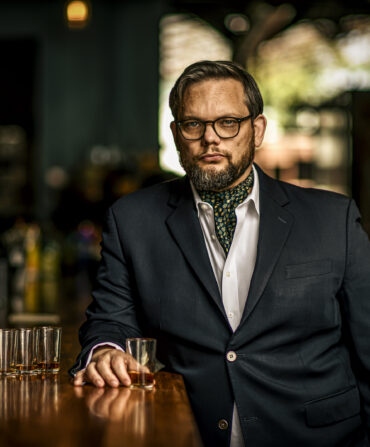The chef Leah Chase has made a living, and a name, by working with her hands, but it’s her tongue that makes you wish you’d brought your notebook to lunch. “Never explain your actions,” she told me recently, interrupting my apology for having fallen out of touch. “Your enemies don’t believe it and your friends don’t need it.”
That adage came from her mother, Hortensia Lange, who gave birth to Leah in January 1923, just months after her first child died of burn complications from a toppled pot of scalded milk. “You don’t question your parents enough about things,” says Leah, who never considered how devastating that loss must have been for her mother until her own daughter and right-hand woman at Dooky Chase Restaurant, Emily, died during childbirth in 1990.
Leah’s life story is filled with heartache and humor, though the way she tells it—by punctuating sentences with a broad smile and another aphorism—leaves you remembering only the latter. The overriding themes at the Lange household in rural Madisonville, Louisiana, were faith and work. Leah’s father, Charles, supported his brood of eleven children by working in a shipyard and keeping a large kitchen garden. Chores were a way of life for everyone. Eating with Leah is the best way to learn about her childhood. Strawberry shortcake reminds her of making strawberry wine; okra gumbo, of sun-drying okra from the garden; roast quail, of shooting the birds that threatened the family’s sizable strawberry patch. Her mother would stew the quail with plums.
Her upbringing bred in Leah a fierce work ethic and a disdain for idleness. “I like to see people work their work,” she says. “Work that show.” It’s also surely what drove her into the workforce shortly after graduating from high school in New Orleans at just sixteen years old. (There was no high school for black students in Madisonville, so Leah lived with relatives in the city during the school year.) She first worked in French Quarter restaurants, and then, after marrying the young trumpet player and orchestra conductor Edgar “Dooky” Chase II and bearing four children, she went to work in her in-laws’ small sandwich shop on Orleans Avenue.
Leah and Dooky had been running Dooky Chase’s for several decades by the time I landed in New Orleans, having transformed it into a white-tablecloth destination for both casual (po’boys) and fine (Shrimp Clemenceau) Creole cooking, not to mention a breathtaking collection of African American art. Leah’s is the definitive Creole gumbo in town, made with a roux the café au lait color of her own skin, plus shrimp, crab, ham, and a highly seasoned fresh Creole sausage called chaurice. Her red beans are legendary, and her gumbo z’herbes (green gumbo) was recently immortalized on HBO’s television series Treme. Not least among the myriad reasons to dine at Dooky Chase’s is a sophisticated all-you-can-eat lunch buffet. Nowhere else does fried chicken remain so hot and crisp-skinned in a chafing dish.
Not just the culinary Creole grande dame of the city, Leah is a renowned revolutionary. In the early 1960s, when it was still illegal for whites and blacks to commune in public spaces in New Orleans, Leah and Dooky hosted mixed-race political powwows in a back room at the restaurant. They fed freedom riders and civil rights leaders, including the Reverend Martin Luther King, Jr. And while I’ve often heard her coaching young wives on keeping their husbands happy, she is a feminist of the first order. “What I hated about the O. J. Simpson trial was that he won by outtalking a woman,” Leah once told me about how her friend, the lawyer Johnnie Cochran, defeated the prosecutor Marcia Clark.

Photo: Chris Granger
Super Fans
Chase poses with NFL players Jonathan and Jordan Babineaux when they stop by Dooky Chase’s for lunch.
Cooking Through a Storm
The first time I met Leah, I cooked for her. Which is something like having Thelonious Monk at your first piano recital. It was the year 2000 and I had just moved to New Orleans from Jackson, Wyoming, an unemployed line cook who had never even attempted a proper Louisiana roux. A family friend trying to help me integrate hired me to cater a small dinner party in Leah’s honor, wrongly assuming that I’d heard of the chef. I intentionally suppress the memory of what I served that night. It could not have been good enough. I do remember clearly, though, how the hostess led a shining woman into the kitchen to meet me. By the time I realized how presumptuous it was for me to address Leah Chase by only her first name, it was too late to turn back. We were friends.
Leah and I didn’t spend much one-on-one time together until after Hurricane Katrina and the resulting levee failures upended our city in 2005. During the first year of recovery, I was without a husband (he relocated temporarily to another state), and she was without a restaurant or a home—unless you count the FEMA trailer where she and Dooky slept. Without a proper kitchen, she was unable to make a living, never mind her own dinner. Our friendship gelled one afternoon when she cooked a monster batch of gumbo z’herbes in my kitchen for a paying group. Ostensibly doing her a favor by lending her space and equipment, I gathered cooking and life lessons that cannot be bought. Leah taught me the importance of a ham stock, she demonstrated the ease of a measureless roux, and she told me that Bar Keepers Friend would restore the Le Creuset pot I thought I had ruined.
During that post-Katrina phase of missing kitchens and husbands, Leah and I also dined out together. During every meal we shared—at Irene’s Cuisine in the French Quarter, at Savvy Gourmet in Uptown, at Parkway Bakery & Tavern along Bayou St. John—she found inspiration in others’ cooking. The younger the chef, the more she seemed to study the food and gather ideas for the far-off day when she might reopen her flooded restaurant. This brings me to what I’ve grown to admire most about Leah. It’s not her fine cooking or her other more tactile accomplishments; not the historical significance of Dooky Chase Restaurant or the fact that I’ve never spent time in her kitchen without seeing her scrub at least one pot—inside and out. Rather, what moves me most is her freethinking, preternaturally young mind. Leah thinks outside the box while simultaneously holding tight to the traditional mores on which she was raised. Physical and mental stagnation are practically a given in later life. At almost ninety years old, and even with legs that sometimes refuse to move, Leah somehow seems to elude both.
Without fail, politics was a talking point during our post-Katrina outings. Often we chattered a bit in my car outside her flooded restaurant before she returned to her trailer. The Lafitte public housing complex had stood across Orleans Avenue from Dooky Chase’s since 1941. Its residents had been Leah’s friends, customers, and, sometimes, unofficial security force. Not one of them was allowed to move back home after Katrina. In December 2006, a year and change after the levees failed, the New Orleans public housing authority decided to raze the Lafitte, along with several other large housing projects. It was a complicated issue but a no-brainer for me. Without giving it much thought, I sided with the residents who wanted to come back. Nothing is a no-brainer for Leah, however, who studied the issue and questioned the decision makers. Ultimately, against her own gut, she sided with the housing authority.
“We were the walking dead before Katrina” is how she explained her position. There had to be a better way. This, I thought—the ability to still wonder in one’s eighties, to ask questions and listen to the tough answers—is what separates the merely successful from the true leaders among us.

Photo: Chris Granger
Reigning Royalty
The queen of Creole cuisine, Lead Chase, in the kitchen at Dooky Chase’s.
Gumbo and Politics
Our frequent outings and intimate conversations have tapered off. I had a baby and Leah has a restaurant again. My son and I lunched there recently, as I was craving a Leah Chase sighting as hard as I craved her fried catfish. Edgar “Dooky” Chase IV, a graduate of Le Cordon Bleu in Paris, helps his grandmother with the cooking now, but Leah was nevertheless in the kitchen at 2:00 p.m. on a Thursday. Prepping chicken.
Many presidents have tasted her chicken. Dooky Chase’s is a regular destination when Air Force One hits Louisiana tarmac. George W. Bush invited Leah to be his guest at some fancy dinner during that post-disaster phase when politicians kept visiting us. He was a nice man, she told me, even if his politics needed a little polish. Our next president, Barack Obama, visited Leah shortly before winning the 2008 election. His politics hadn’t yet had time to tarnish, but Leah admonished him anyway—for shaking hot sauce over her gumbo before tasting it. Politics is one thing; seasoning is another.








